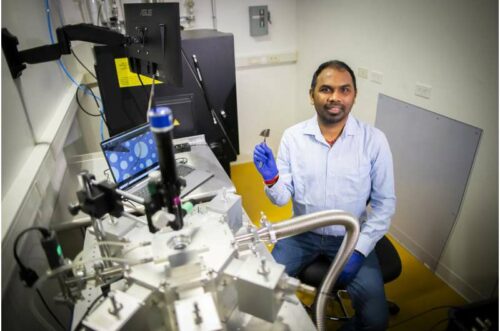From deep-earth exploration to the depths of space, discover how this durable technology could power the future of AI and beyond.

When smartphones shut down during a beach day, it’s typically due to their electronic components failing to withstand the heat. This failure occurs because the memory chips aren’t designed to handle extreme temperatures, causing data loss as electrons destabilise and escape. Addressing this issue, researchers at the University of Pennsylvania’s School of Engineering and Applied Science have made a significant breakthrough.
Their teams developed a memory technology that endures temperatures up to 600° Celsius (1112° Fahrenheit). This temperature is more than double the threshold of commercial memory drives. Impressively, their device maintained stability for over 60 hours, suggesting a new benchmark in durability.
The new memory device uses ferroelectric aluminum scandium nitride (AlScN). Unlike traditional silicon-based memories, which fail around 200° Celsius (392° Fahrenheit), AlScN can retain data at much higher temperatures. It operates on a metal-insulator-metal structure featuring nickel and platinum electrodes and a strategically thin AlScN layer, only 45 nanometers thick. This configuration helps maintain efficient operation even as temperatures cause particles within the material to move erratically.
This advancement is not just about enhancing the resilience of memory storage. The researchers envision their technology enabling more sophisticated computing in extreme conditions, such as deep-earth drilling or space exploration, where conventional electronics would falter. For example, their device could drastically improve the efficiency of artificial intelligence (AI) systems that currently suffer from data transfer bottlenecks between the central processing unit and memory storage.
The team highlights another critical benefit of their invention: by integrating memory and processing units more closely, their “memory-enhanced compute” approach could eliminate inefficiencies inherent in traditional computing architectures. This integration could potentially allow high-performance computing in environments where even silicon carbide technology, a standard for high-temperature electronics, falls short.
The team’s innovation, with its potential to revolutionize fields from geothermal energy extraction to interplanetary exploration, opens up exciting possibilities for deploying advanced computing technologies in harsh environments. Their ongoing research aims to further integrate this technology with existing high-temperature computing systems, setting the stage for new applications that require durable, high-speed data processing. This could lead to significant advancements in fields such as deep-earth drilling, space exploration, and even artificial intelligence, demonstrating the broad impact of this breakthrough.







